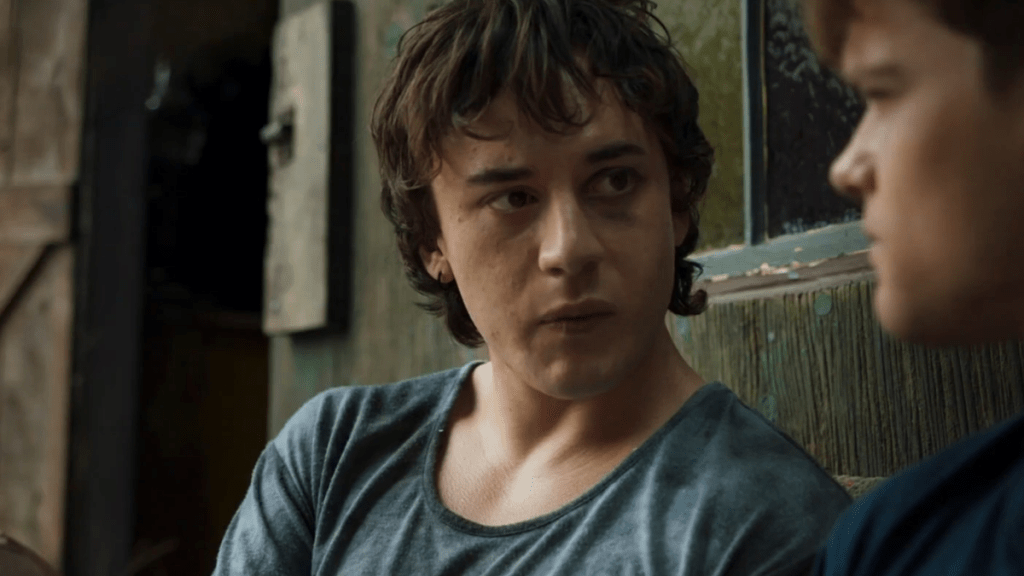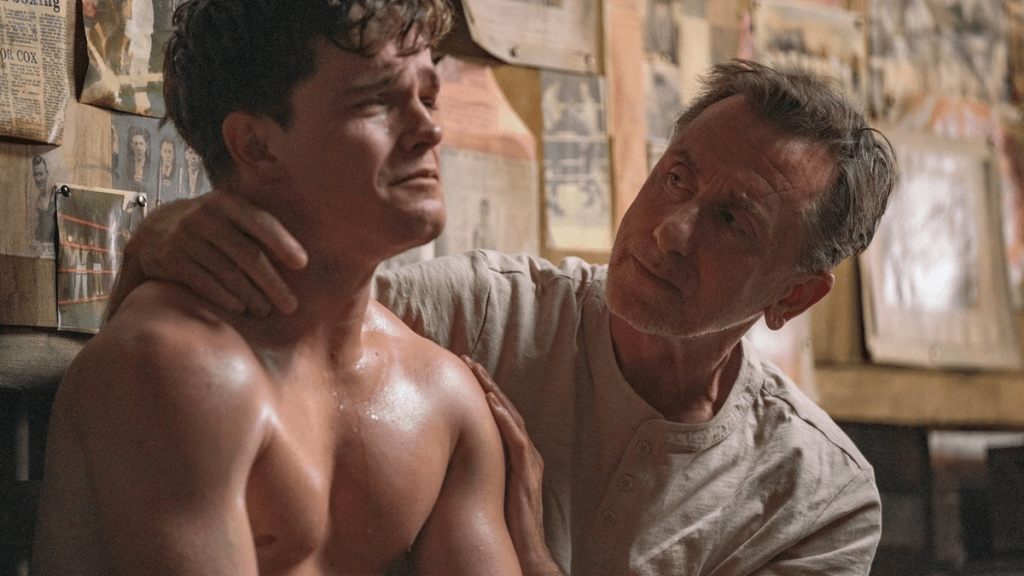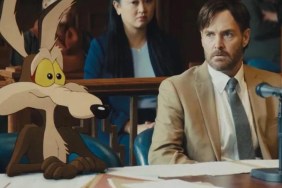ComingSoon Senior Editor Spencer Legacy spoke with Punch stars Tim Roth and Jordan Oosterhof about the boxing drama movie. The duo spoke about handling heavy themes and filming in New Zealand.
“Jim is a promising teenage boxer who’s training under the watchful eye of his demanding and alcoholic father,” reads the film’s synopsis. “When Jim develops a relationship with a male classmate, they must navigate isolation, homophobia, and the brutality of small-town life. As Jim discovers what it means to be gay, he soon realizes how little strength has to do with heroism.”
Spencer Legacy: What was it about Punch that really first drew you to the project?
Jordan Oosterhof: The script, man. I just got sent it and opened it up and read it. And I thought, “Man, this is something that I really want to be part of.” There was something sort of tangible about it, even from the first moment I read it. I could feel Jim’s arc, I could feel his emotion in the scenes. There was just … sometimes as an actor, you get given a script and you’re like, “Man, something inside this resonates with me on a deep level.” So it was like that, and then I thought, “I will just do whatever I can to have any part in it.” Then it ended up being the lead role. So here we are.
Tim Roth: I just got a note from my guys in London that I’ve worked with since the beginning, from one of the agent types and he said, “Tim, I’m sending you something. I think you should take a look at this.” Then it landed on me and I read it. What’s interesting about it is this story could be told badly as well. This could be so easily messed up. When you sat and you read it, and I read the whole thing. I didn’t care about the character I was playing, I just wanted the story. I wanted to let that story wash over me. You felt that there was somebody behind this that really cared about it.
That and it was so nuanced that you went, “Oh, I never thought of that.” You know? “Oh my God. Ooh … ow.” You were taken on this journey and you were so hoping for an outcome. It’s always refreshing when something is really good. It’s a rarity. Then step back from it and go, “Okay, what about this character?” And I could recognize the character. I’ve been around alcoholics all my life — most of us have. So why is he self-medicating? Where does his pain come from? How does it express itself, or not? What does he keep bottled down? Why? And the love for his son that is not expressed, but is expressed in the script, I felt was a very beautiful thing to have an attempt at. But I felt I was in safe hands even though I’d never met or talked to the writer as soon as I read the script.
Jordan, Tim is a cinema legend. What were your first thoughts before production started? What was it like to work together?
Jordan Oosterhof: When I saw Tim’s photo on the thing, I was just like, “Is this an error? Did someone get this wrong? Why is Tim on there?” But yeah, I was really excited, to be honest. A lot of my friends and stuff were like, “Oh, are you nervous?” I was like, “No, I’m not nervous. ” It’s like playing football with a Premier League player. You just are eager and see how it goes. It was just great fun and a real good challenge, the whole process.
Tim Roth: Me and Jordan, we just dived in once they let me out of isolation. But we didn’t have that much time. And you mentioned that, Jordan. We had a few days trying to get to know each other. He took me up the side of a volcano. Just chatting and talking and doing that kind of thing, trying to get to know each other a bit so that when we came to being on set and working on the character stuff and with the cameras and all of the noise of that around, we felt comfortable with each other. Quite often, you don’t have too much time to do that. This was the case — there was a time crunch, but [we] managed to work it well, I thought, and felt comfortable in the scenes that we were doing together.
Jordan Oosterhof: Yeah, we started with some really, really nice wholesome scenes initially. The first ones on set itself, like giving the sandwich and all that sort of stuff. They were a good way to work in rather than the intense stuff first [Laugh].
Tim, you touched on it a bit before, but your character deals with some really heavy themes like alcoholism. He has his own human flaws but he’s very multi-layered. How did you go about portraying him both sympathetically and realistically?
Tim Roth: I had a history with that, with my father growing up. He self-medicated because of what he’d seen in the second World War. He was 17 when he went into that war in 1939 and was there for the whole thing and saw persecution, saw a lot of death. So he came back very damaged and he was already damaged when he went in as a child. It was a lot. So I grew up around his drinking and I loved him, and he was funny — really funny. But then it wasn’t funny as the alcohol took over.
So yeah, I had experience of it and I wanted to put that there. And the character that that Welby [Ings. director] had drawn gave that opportunity. It was very perceptive. Then I brought my experiences to that, as well, and Welby was very comfortable with me putting them in and around the character. So it was one of those nice … it was a lucky break to get a chance to have a go at that.
Jordan, you deal with heavy themes of your own. Your character is struggling with his sexuality and I think that you really conveyed that very thoughtfully. What were some challenges that came with portraying that?
Jordan Oosterhof: Obviously, I sort of read it in the script. I don’t have any personal experience with that sort of struggling of to find my sexual identity, but I’ve seen it firsthand. My twin sister has dealt with that her whole life and I’ve seen how it’s affected how people interact with her and how my own family interact with her.
So all I could do with it was approach it with as much sort of heart and caution and care as I could. For Welby to trust me with that meant a lot to me. All I could do was approach it as honestly as I could and as vulnerably as I could, because someone at that age, that sort of quintessential crossroads of becoming a man — whatever that’s supposed to mean anymore — and struggling with that … that’s a tough point in anyone’s life. So yeah, all you can do is try to interpret it and feel it and see how it goes.
Tim Roth: It’s that thing of respecting the material, isn’t it?
Jordan Oosterhof: Yeah.
Tim Roth: Yeah, he’s given you that, so you bring everything to it that you think he needs.
You’ve both talked a bit about the director, Welby Ings. He’s very interesting. He’s also a teacher in addition to a filmmaker. What was working with him like?
Jordan Oosterhof: He’s like a teacher, not only in the office, but he’s like a teacher in real life. Like if you spoke to Welby over a camera, he would still be having that teacher vibe, like he cares about you and your growth as well as his own personal stuff, mate. He’s just a collaborative, wonderful guy. Honestly, man, this is a blessing. I would pay to sit and just be in the corner of a room while Welby speaks and interacts. To be able to actually act as material and be part and know him so well … that’s like icing on the cake. He’s a really wonderful guy.
Tim Roth: He is really funny.
Jordan Oosterhof: Yeah.
Tim Roth: It’s really funny. Some of the time, some of the things he comes out with. Also, you could just talk to him about construction, because he built his house with his own hands. It’s up in the woods, in the jungle, kind of. It’s so … that’s very Welby, right? That’s very Welby.
Jordan Oosterhof: Yeah, it was almost like a real life movie character himself.
Tim Roth: Yes, yes! Completely. So funny.

Jordan, what kind of training did you do for the movie to get ready?
Jordan Oosterhof: Five days a week of boxing for three months and I was being coached by Cam Todd, who is personally somewhat involved in the film as well. I was training with Commonwealth Games boxers in New Zealand, so they were Commonwealth Games boxers, New Zealand Championship boxers, and then me on the side trying to not get punched in the face — which didn’t work for the first month and a half. It was … it was a lot, it was a lot to take on, but it was a really great challenge. And being a sponge around people who were so good made it so that I could pick it up pretty quick.
Tim, what was it like for you to film in New Zealand? Had you been before or was this all entirely new?
Tim Roth: No, it’s completely new. I had no idea. We’d been living in a bubble, because it was right in the middle of the pandemic. There were no vaccines, none of that stuff was happening. I was in California and we were also in a bubble because my in-laws were very high risk. So we were spraying down the food and so we were in that mode. We didn’t know what was going on. Then I got on a plane and went to New Zealand — like I’ve said before, the safest place on the planet. I mean, it was just like, “Whew.” But it was really difficult initially, when I came out of the quarantine hotel, to be around people. [It] was like, “Oh my God.” I mean, everyone’s like, “Hi, how you doing?”
No masks, no nothing, you know? And loads of people. There was a dinner and there was a ceremony, a merry ceremony. It was so overwhelming that first night, it was just incredible. It’s, first of all, a stunning place and all of that, but the film crew that we had, they’ve been doing The Lord of the Rings stuff for a long time. Film crews out there … you’ve got some of the best film crews in the world. They were looking for anything else, just anything else. And along comes this real little independent film, right? Difficult subject matter, all of that stuff. Like this, compared to what they’d all been working on, and they dived at. So we had like Matt Henley, who’s a fantastic cinematographer.
All of the crew were incredible, incredible — like really high end. So I was in this magnificent location with brand new actors, which is some of the best time that you can have. And a brand new director with a story to tell. It was just like gold dust for me. It’s incredible. It I wish it’d lasted longer. Unfortunately, they couldn’t afford it. [Laugh]. But, you know, it would’ve been great if it was a four-month shoot. But, you know, we shot it in a few weeks.
Jordan, is there a specific message that you really hope people take away from this movie?
Jordan Oosterhof: I think the theme that stands out to me the most and that really translates is the sort of universal feeling of just wanting to fight or having to fight for where you belong in the world. Jim and Whetu are young people that are confused and feel like they’re not really in the right place. Trying to be free, trying to learn and grow. I think that anyone can watch the film and resonate with that.
So many people in life are born, they feel, in the wrong town or the wrong country or set of circumstances. Their family doesn’t get along with them, their family doesn’t accept them — whatever it is. I think learning to fight, to find that place where you belong and can be authentically yourself, is something that any person can walk into Punch, sit down, and feel and be inspired by the end of the film. So I’m very proud of it for that.

Tim, on a bit of a different topic, you returned as, The Abomination in She-Hulk recently, but this character was way more comedic and way more zen. What was it like to reinvent a character in that way?
Tim Roth: I just thought it’d be fun and they were willing to let me do it. But the feeling really was … I mean, I was very surprised they knocked on the door, so I was like, “Sure, why not?” Then, “Let’s see what the character is.” I met with them before and we talked character and we did all that thing. They were different directors, so they had different feelings about it, blah, blah, all the usual stuff. But they let me play. Especially towards the end, they really did.
When Mark [Ruffalo] came on … Mark and Tatiana [Maslany] together were hilarious. So we got to play. We got to mess around with it. The one thing that I said for everyone to be wary of was, yeah, he’s sweet, isn’t he funny … is he though? Is he? [Laugh]. Because she got him out of prison — now what? So there was always that thing of, “Is it a con? Is it a con? Is it a con? Here we go, here we go,” and so on and so forth. We got to play around on that. So I don’t know if it’ll go anywhere, but it was a lot of fun to do.










